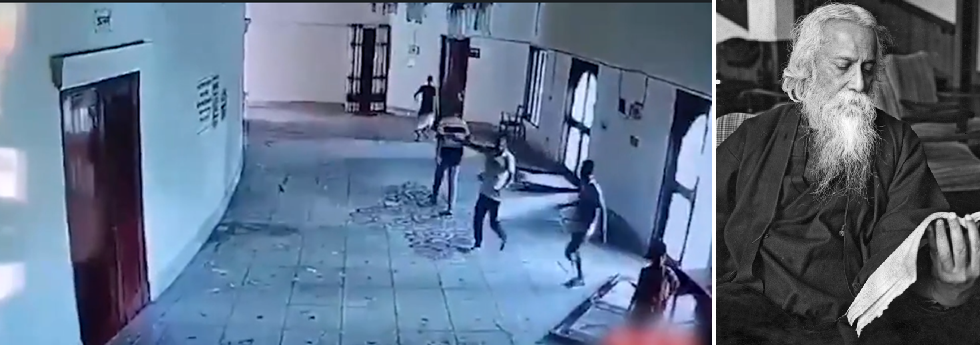
A violent mob vandalized Rabindranath Tagore’s ancestral home in Bangladesh following a parking dispute
A Dark Day for Cultural Legacy: Rabindranath Tagore’s Home Attacked in Bangladesh
In a deeply disturbing incident that has shaken the cultural conscience of South Asia, a violent mob vandalized the ancestral home of Nobel laureate Rabindranath Tagore in Sirajganj, Bangladesh. The attack, which took place on June 10, 2025, targeted the Rabindra Kacharibari, a historic mansion-turned-museum that once served as a creative retreat for the legendary poet. The mob stormed the premises, damaging the auditorium, smashing windows and doors, and assaulting museum staff, including the director. The site has since been closed to visitors, and a formal investigation is underway.
What Sparked the Violence?
The violence was reportedly triggered by a dispute over a motorcycle parking fee. On June 8, a Bangladeshi expatriate named Shah Newaz visited the museum with his family. After paying for parking and entry, he was allegedly denied a receipt. When questioned by staff at the gate, a scuffle broke out, and Newaz was reportedly confined and assaulted by museum employees. News of the incident spread rapidly, sparking public outrage. On June 10, locals staged a protest and formed a human chain outside the museum. What began as a peaceful demonstration quickly escalated into mob violence, resulting in the destruction of a site that holds immense historical and emotional value.
Rabindra Kacharibari: A Symbol of Literary Greatness
The Rabindra Kacharibari, also known as the Rabindra Memorial Museum, is not just a building—it is a living testament to Tagore’s genius. Purchased by his grandfather Dwarkanath Tagore in 1840, the estate served as a revenue office and residence for the Tagore family. Rabindranath Tagore spent considerable time here during the 1890s, penning some of his most celebrated works, including Sonar Tori, Chaitali, and Bishorjon. The mansion has since been preserved as a cultural heritage site, attracting scholars, tourists, and admirers from around the world.
Political and Public Outrage
The attack has drawn widespread condemnation from political leaders, cultural organizations, and citizens across India and Bangladesh. India’s Ministry of External Affairs labeled the act as “despicable”, calling it an attempt to erase symbols of tolerance and intellectual legacy. Prominent Indian political parties, including the BJP and Trinamool Congress, have urged the Indian government to initiate diplomatic dialogue with Bangladesh to ensure justice is served. “Rabindranath Tagore is no ordinary personality. When his house is attacked, his ideology is attacked,” said BJP spokesperson Sambit Patra, calling on the global community to condemn the act.
Investigation and Security Measures
In response to the incident, Bangladesh’s Department of Archaeology has formed a three-member committee to investigate the attack and assess the damage. A case has been filed against 50 to 60 individuals, with 10 to 12 names identified, though no arrests have been confirmed as of yet. The museum’s custodian, Md Habibur Rahman, announced that the site has been temporarily closed due to “unavoidable circumstances,” and security has been tightened to prevent further unrest.
A Pattern of Cultural Erosion?
This is not the first time that cultural and historical landmarks in Bangladesh have come under attack. In recent months, there have been reports of vandalism at the Mujibnagar Memorial Complex and statues of Sheikh Mujibur Rahman, the country’s founding father. Critics argue that these incidents reflect a growing intolerance toward cultural symbols, especially those associated with pluralism, literature, and secular values.
The Global Significance of Tagore’s Legacy
Rabindranath Tagore is not just a Bengali icon, he is a global literary figure, the first non-European to win the Nobel Prize in Literature in 1913. His works have inspired generations across continents, and his contributions to education, music, and philosophy remain unparalleled. The attack on his ancestral home is not merely an act of vandalism; it is an assault on the shared cultural heritage of humanity.
Conclusion: A Call for Accountability and Preservation
The vandalism of Rabindranath Tagore’s ancestral home is a shameful and alarming event that demands immediate action. It underscores the urgent need to protect cultural landmarks, not just as relics of the past but as living symbols of identity, creativity, and unity. As investigations continue, the world watches closely, hoping that justice will be served and that such acts of cultural violence will never be repeated.
Stay updated with the latest news on Rapido Updates. Keep yourself updated with The World, India News, Entertainment, Market, Gadgets, Sports, and many more
1 thought on “Mob Vandalizes Rabindranath Tagore’s Ancestral Home in Bangladesh: A Shameful Assault on Cultural Heritage”